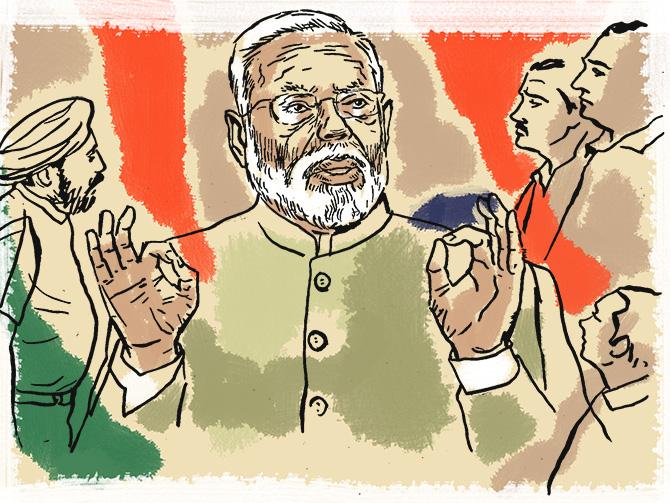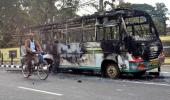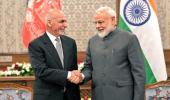'He sees himself as a transformative figure who will move the country from a Nehruvian to a Hindutva India.'
'If he is able to achieve that, he will be like a Hindu king.'

"The biggest danger is that majoritarianism is getting normalised, insidiously and overtly... We are bringing the worst, not the best in us. Now Godse is being glorified. Didn't the BJP know that Pragya Thakur was a follower of Godse when they gave her the ticket? Of course, they did. They gave a ticket to a terror accused. Whether she is convicted or not, her politics is brazenly majoritarian," Rajdeep Sardesai, journalist and author of 2019: How Modi Won India, tells Rediff.com's Archana Masih in the concluding segment of the interview.
You start your book with the scuffle with Modi supporters in New York. What is the personal price you have paid for not toeing the government line?
I don't want to make too much about myself. I start the book with that to offer an explanation of how I found myself in a situation that I was not really anticipating.
It was the cult of Modi and the moment I asked questions I was heckled.
I guess no one will make me the editor of a newsroom at the moment. I may be denied access to a Modi interview, but beyond that as long as you don't have any financial skeletons in your cupboard, I don't think they can do too much.
The only price I pay is the inability to get access to these leaders because you are seen as asking too many questions and being on the other side of the divide.
It is a small price to pay. We are at a very important time in our country's history where you have to stand up and be counted as a journalist and ask questions of all, but particularly of those in power.
How will Modi leave his imprint on India's history?
Mr Modi has been prime minister for only five-and-a-half years. Who knows he may be prime minister for another 15. Perhaps he is just starting off.
He sees himself as a transformative figure who will move the country from a Nehruvian to a Hindutva India.
If he is able to achieve that, he will be like a Hindu king. Many Hindu kings could not conquer the Deccan. Similarly, the BJP is primarily a party of north and western India. Though it has made inroads in the east, the BJP is primarily a northwestern Indian empire.
Mr Modi will like to be seen as the man who made the BJP a formidable political party and sees himself as a man who transformed India.
In the atmosphere of growing majoritarianism, is the 'Us vs Them' divide here to stay? Or you think people will see reason?
The biggest danger is that majoritarianism is getting normalised, insidiously and overtly.
Many don't rent their homes to young Kashmiri Muslims because a stereotype has been created in the minds of many Indians that they are stone pelters.
Ghettoisation is complete in many societies. Ahmedabad is an example where there is a Muslim and a Hindu area. It did not only begin after 2014, but it has become very overt and brazen. It is spreading to other cities.
It is also evident in political empowerment. There are fewer Muslim MPs than ever before. Every party is chasing the Hindu vote overtly.
The Citizenship Bill discriminates on the grounds of religion. That is not what India should be.
We are bringing the worst, not the best in us. Now Godse is being glorified. Didn't the BJP know that Pragya Thakur was a follower of Godse when they gave her the ticket?
Of course, they did. They gave a ticket to a terror accused. Whether she is convicted or not, her politics is brazenly majoritarian.
She is an unapologetic espouser of hard Hindutva who looks at the Muslim as the enemy.
We are looking for new enemies -- urban Naxals, tukde tukde gang, some enemy or the other which keeps this majoritarian wheel turning.
What is the future of India's minorities?
I don't think victimhood is the answer. They need to work harder. The majority also needs to work harder to create a sense of inclusiveness. We need to find more spaces where we can talk to each other.
Minorities are being trapped in a sense of fear and hostility. They are also unwilling to step out of their ghettos. They are looking for their own leaders like Asaduddin Owaisi who play to their fears and prejudices.
The romantic in me says this country is bigger than the minds of bigots, but the reality is that this prejudice and bigotry will one day result in the Ahmedabad model of separate communities living separately.
One of the reasons I hold onto cricket is when Mohammad Shami bowls, Indians don't see him as a Muslim, but as a great cricketer.
We need a Gandhi to bring the Hindu-Muslim compact back.
We are in the 150th year of Gandhi's birth and we have a Pragya Singh in Parliament. What could be a bigger disgrace!
How do you see the situation in Kashmir unfolding in the next few months?
Like I did with demonetisation, I thought I will wait for six months on Kashmir.
My own view is that scrapping Article 370 is not the solution to ending terror is Kashmir. The end of terrorism is a very complicated issue. We have to win the hearts and minds of the people.
People can't be kept under the gun for so long. Even previous governments have tended to treat Kashmir as a piece of territory.
Kashmiris have to be convinced that they will be part of a genuinely inclusive India. Detentions and suspicion are not going to change anything. How can political leaders be detained under provisions of the security act with no justification?
The matter has been delayed in the courts. Whatever your big idea for Kashmir is, it cannot sustain without observing basic human rights.
Former chief ministers Farooq Abdullah, Omar Abdullah, Mehbooba Mufti have been in preventive detention without cogent reasons.
The worse that Farooq Abdullah can do is a give a speech. Is the Indian State scared of an 82-year-old Farooq Abdullah? Is the Indian State so weak that Farooq, Omar and Mehbooba can bring it down?
I keep hearing Kashmir is normal, but what is normal about keeping three chief ministers in detention and hundreds of others?
The brazen use of State power has never worked in this country in the long run. The history of this country shows that Indians will push back.










